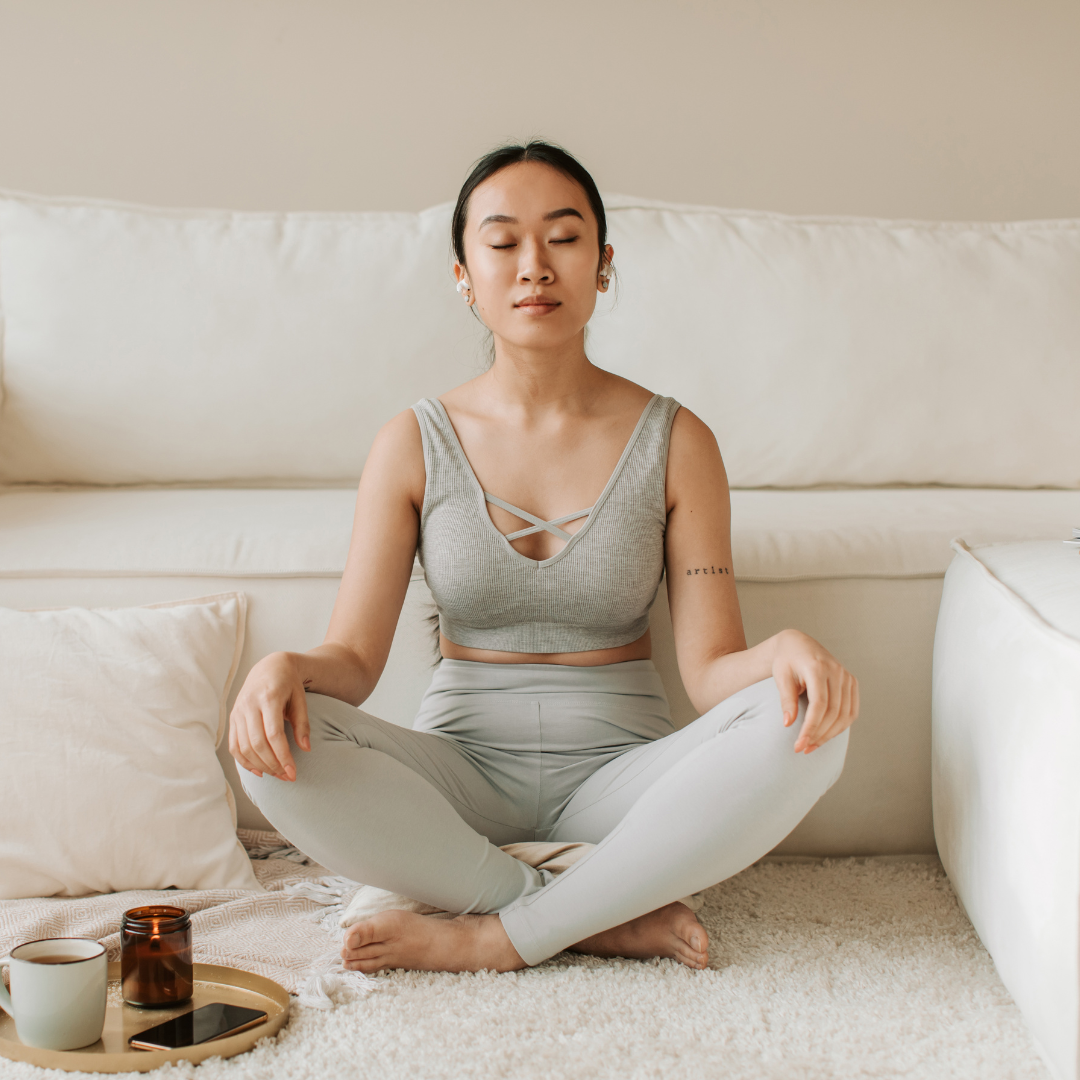Discover How to Meditate: Your Path to Inner Peace

Starting a meditation journey is like finding a quiet spot in a busy world. It leads to discovering more about yourself and finding balance. You'll learn important things about your life while enjoying calm and self-awareness. This is true for both new and experienced meditators. Meditation helps explore and balance our thoughts, feelings, and spiritual side. It is known to make your mind sharper, improve focus, and lower stress levels. By learning the right ways, you can enjoy the full benefits and move closer to peace and happiness.
We aim to make the art of meditation easy to understand, sharing tips and its big impact. You can choose from different ways like focusing on your breath or with guided sessions. Find what feels right for you. Also, using tools like Calm's apps with guided sessions and relaxing sounds makes the journey easier. Come with us to explore meditation's deep effects on how you think, feel, and grow spiritually.
Introduction to Meditation
Meditation goes beyond a habit; it's a journey to know yourself better and find peace of mind. It's an old practice that helps us be at peace with ourselves. By staying aware, we can face our busy lives with a quiet mind and calm spirit.
The Timeless Practice
Meditation has been around for ages, with many techniques and goals. In the 1970s, a Harvard researcher named Herbert Benson, MD, found something interesting. After studying transcendental meditation, he called it the 'relaxation response.' This response lowers blood pressure, improves blood flow, and makes our heart beat slower. Other effects include less sweat, calmer breathing, reduced anxiety, and more happiness. Practicing for just 5 minutes daily helps fight stress and clear our minds.
Cultivation of Awareness
Being more aware through meditation helps us notice our thoughts and feelings without judging them. A Buddhist technique, Vipassana, helps us be more mindful or “sati.” It eases pain, reduces worry and sadness, boosts thinking, and changes our brain. These practices help control our emotions and think better, making life more meaningful.
Achieving Mental Clarity
Mental clarity from meditation means calming our busy thoughts. It creates a peaceful space from our fast daily life. This activity can boost our focus and sleep quality. Having a regular time and place for your practice builds a strong habit. This routine really betters our thinking and happiness. Buddhist thinking also highlights that meditation frees our mind from things we can't control.
The Benefits of Meditation
Meditation is a powerful practice that helps us find balance and peace. Its key benefits include lowering stress and improving our focus.
Stress Alleviation
For thousands of years, people have turned to meditation to deal with stress and anxiety. Studies show that regular meditation can cut down stress. It can also ease anxiety linked to conditions like IBS, PTSD, and fibromyalgia.
A meta-analysis found that meditation can lower anxiety, especially for those already quite anxious. Techniques like mindfulness meditation work well for people with stress-related health problems.
Enhanced Concentration
Meditation also boosts our ability to focus. Even just 13 minutes of daily meditation can make a difference.
Practices like Kirtan Kriya improve memory in older adults with age-related memory loss. Meditation keeps the mind clear, which can help reduce the risk of dementia.
By learning to focus through meditation, we also gain mental strength. This helps us concentrate better and break bad habits.
Regular meditation can lower stress and sharpen our focus, proving its many benefits for our health.
Types of Meditation
There are many types of meditation, each with its own benefits. These techniques help with focus, reducing stress, or spiritual growth. Knowing these can help you find what works best for you.
Mindfulness Meditation
Mindfulness meditation comes from Buddhist practices and is very popular in the West. It focuses on being aware of the present. This can lower stress and help control emotions. People who practice focus on their breathing and how their body feels. This helps them think better and handle their feelings well.
Transcendental Meditation
Transcendental Meditation uses mantras to find calm and peace. You meditate twice a day for 20 minutes. It's been proven to reduce stress and depression in different groups, like teachers. In TM, instructors help you do it right for the best results.
Breath-Centred Meditation
Focusing on your breath is key in breath-centred meditation. This can make you less anxious, more focused, and able to cope better with your feelings. For example, you can practice breathing deeply and being mindful. This can make you feel more in the present moment.
Trying out these meditation styles can really improve your mind and feelings. They can lead you to a calmer and happier life.
How to Meditate for Beginners
Starting meditation can be intimidating. But, with the right guidance and practice, it turns into a rewarding experience. Here are some key tips to begin your meditation journey.
Setting Up Your Space
It's important to create a peaceful space for meditation. Your meditation area should be free of distractions and noise. Although pure silence isn't vital, a quiet spot helps with focus. Having a visible yoga mat or cushion can remind you to meditate each day. This daily reminder aids in making meditation a regular habit, helping you focus better.
Finding a Comfortable Position
It's essential to find a comfy position for meditation. Sitting up straight, on a chair or cushion, helps keep you focused. Start with short sessions, like 5 to 10 minutes, and then gradually increase the time. Guided meditations are great for newbies because they provide clear instructions.
Using a Meditation App
Meditation apps are great for improving your practice by offering structured sessions and reminders. Using apps like Headspace regularly can reduce stress and boost your happiness. They guide you step by step, making them ideal for beginners in meditation. Even just 12 minutes a day with these apps can increase your focus and mindfulness.
Advanced Meditation Techniques
Advanced meditation techniques take basic practices to a higher level. They bring more peace and make us more aware. We'll look at three methods: exploring the body through a body scan, balancing energy with chakra meditation, and a different approach with walking meditation.
Body Scan Meditation
With body scan meditation, we focus closely on every part of our body. This lets us really feel every touch, ache, or tingle. It helps reach deep calm and clear thinking as we move from feet to head. Doing this often makes it part of our everyday life, removing the need for set meditation times. Body scan fits perfectly with 'Dhyana.' Here, the main idea is to look within, not out.
Chakra Meditation
Chakra meditation works on the seven energy points in our bodies. Each chakra is linked to a major system and key emotional needs. To balance them, we focus, imagine, and use special sayings for each one. This way brings a stable mind and deep happiness, easing our troubles. Balancing chakras improves how we feel and our spiritual health.
Walking Meditation
Walking meditation brings our focus to our steps and our breath. It's a way to meditate while moving, which is different from sitting. This can help with stress, mood, and keep us fit. Mixing meditation with walking makes it part of our daily life. It helps create a life that's calm and clear, even while we're busy.
Overcoming Common Challenges
Many who meditate face common challenges, which can deepen the benefits, like better focus and concentration. A main issue is thinking about other things. 40% say they have trouble focusing during meditation. To help with this, try counting your breaths or focusing on how you breathe deeply.
Another hurdle is falling asleep, which 30% find difficult to avoid. To tackle this, meditate when you're most awake. Also, trying meditation while walking can reduce restlessness and discomfort for 15% of meditators.
Feeling upset or anxious is common, and it's important to have personal strategies. For those struggling, loving-kindness meditations or guided meditations could be helpful. If you find yourself falling asleep, it might mean you need more sleep. So, making sure you sleep enough is key to meditation success.
One big issue is finding time to meditate. A whopping 65% struggle with their busy schedules. Even just 15 minutes a day can help a lot, making meditation a daily habit and overcoming these challenges little by little.
Dispelling Meditation Myths
Meditation is often misunderstood, leading to myths that hide its true power. By understanding and casting aside these myths, we can truly benefit from meditation in our lives.
Meditation Is Only for Relaxation
Many think meditation is just to relax. It's more about being aware and accepting all thoughts, even the difficult ones. Meditation isn't just about calmness but about knowing yourself deeply. Things like mantras and chanting can help but aren't necessary. Also, meditation is a long-term journey like getting fit, not a quick fix.
You Must Clear Your Mind Completely
There's a myth you must silence your mind to meditate well. But the average person has 50,000 thoughts a day. The aim isn't to stop thoughts but to watch and control them. Everyone struggles with a wandering mind at first. The key is to find what works for you. Don't get discouraged by thinking you must clear your mind completely. Feeling weird or uncomfortable initially is normal.
Exploring Guided Meditation
Guided meditation is great for beginners. It's easier for those who find it hard to focus alone. Many find it helpful to start with guided meditation. It teaches them to come back to the now or their breath, which can really lift their spirits and lower stress.
Studies show that all types of meditation lower stress and anxiety. They make you feel less down and can help with body pain. Plus, they boost your immune system. Guided sessions can make you feel more at ease and patient. This affects your life in many good ways. You can do short mindfulness exercises any time, which helps keep your mind balanced.
The U.S. Marines got better at focusing by doing guided meditation. Research from Yale shows both guided and solo meditations make people calmer. There's no big proof that one way is better than the other. So, guided meditation is a good choice to begin your mindfulness journey.
Mindfulness is about being fully in the moment without judging. Jon Kabat-Zinn says it wakes up our brain to think in new ways. This makes us understand ourselves better. It cuts stress, boosts our focus, and even helps us sleep better.
Guided meditation helps us be open and warm to new experiences. Doing it regularly makes focusing on the now a habit. This builds our emotional strength and helps us grow.
The Headspace app gives many meditation options. You can choose what fits your mood and time. This makes practising meditation easier and more enjoyable. It guides you to a calmer, more balanced life.
Personal Stories and Experiences
Meditation is a powerful tool that can change lives in great ways. Talking about their meditation journeys, people show us the growth and peace they found. Each story is a shining example of what's possible through meditation.
A Journey to Inner Peace
Shivani's story is both captivating and inspiring. At first, she tried meditation to help with concentration but didn't see results right away. When she started using the Black Lotus app, things started to change. She noticed her focus improve after 100 days. Her stress levels went down, and she could focus better on her tasks. This shows how sticking to meditation can help with personal growth and anxiety.
Transformative Tales from Practitioners
Looking at different meditation stories, 70% of people said they saw good changes. Sylvia started because her husband inspired her after a retreat, and she felt more aware and free. Joseph got into it while in the Peace Corps, influenced by Western Buddhist monks, which shows how varied paths to meditation can be.
For 60% of those who practice, meditation helped with mental health issues like depression and anxiety. Charlotte found meditation late in life but it still greatly improved her clarity and peace. 45% feel more patient, strong, and peaceful thanks to meditation, just like Shivani.
But meditation goes beyond the mind. 30% experienced better physical health thanks to meditation. Exploring oneself and life's meaning is a common benefit, reported by 25% of practitioners. Teachers remind us that lasting change comes from continuous effort, not just short moments of meditation. This underlines meditation's ability to truly transform us.
Conclusion
Starting the path to peace through meditation is powerful. It brings our mind, body, and spirit together. This makes a peaceful place inside us. We've seen how valuable meditation is with help from science. A 2013 study proved its worth in healing sickness.
Meditation makes our brain work better. It lowers stress and fear. It might even stop diseases like Alzheimer's. This shows how meditation changes lives. And, doing it for two years can lead to big improvements. You get to know yourself better, become more organised, and learn to priories well.
The journey towards peace is important. Meditation is not just an activity; it's a life choice. Doing it often brings deep peace and strength. It's like how calm Samurai warriors are in tough times. So, choosing to meditate is more than getting brief moments of peace. It's a lifelong path to a balanced and happier life. It brings a deep and lasting sense of well-being. This is what true enlightenment looks like.

